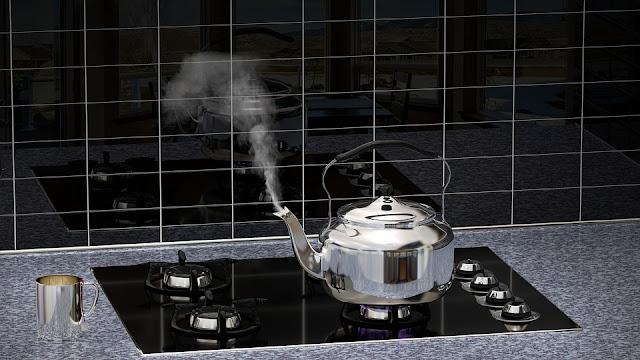How to Stop Limescale From Ruining Your Appliances
Today we will discuss a problem that most people living in the UK are very concerned about, the problem is with limescale buildup that can affect home life. As much as 60% of all residents in the UK live in homes that are supplied with hard water and this affects energy levels, the health of hair and skin and the longevity of many kitchen appliances.
There is a good chance that you are one of these people and it is important to understand the issue and how it can affect you before its effects get out of control. If you are not sure whether or not your home has hard water there are online postcode checkers that can reveal which areas in the UK are affected by hard water.
What is limescale?
But before we get into our discussion of the effects of hard water and what remedies can be applied, we should begin with a small review of the problem. This takes us back to school days where we learned all about the water cycle.
Water flows over the land and is purified by its journey through the soil, rocks and substrata of the earth’s core. As it flows through chalk and limestone, water collects a heavy content of minerals, especially calcium and magnesium. Throughout this journey, water becomes highly mineralized and becomes “hard.” Soft water does not carry such a heavy mineral content.
Of course, hard water isn’t harmful in itself and actually the minerals in hard water are generally good for the body. But when this water is heated the minerals react to heating elements and harden. This can cause hard water to leave behind scaly deposits that collect on shower heads, pipes and especially on the heating elements in kettles, radiators, and a wide variety of other domestic appliances.
You can see a perfect example of this by popping open your kettle and taking a look inside. You will see the metallic interior is coated with a whitish build up. Of course, in your washing machine, coffee maker and other appliances, this is not so evident. Because these build ups are generally out of sight and therefore out of mind, they don’t generally get so much attention. But if a great quantity of these mineral deposits are allowed to build up, the appliance can soon fail and this will lead to the need for replacements.
Let’s take a closer look at the major differences between hard and soft water before we continue:
Hard water — this is water that has a high content of magnesium and calcium. As we know, both of these minerals are good for our health. Hard water also makes for a better brew when making teas and coffees as they absorb the phytochemicals released in the brewing process. Many people say that hard water tastes better than soft water.
On the other hand, hard water can cause buildup in pipes and appliances and cause other problems if left unchecked.
Soft Water — soft water lacks this mineral content and therefore reacts better with soaps and cleaning agents. It is generally gentler on clothing and does not dry out the hair and skin as fast as hard water. Furthermore, appliances that use soft water will not collect minerals and this will help them to last longer.
But soft water can detract from the brewing process for teas and coffee. Furthermore, it takes more water to rinse detergents from clothes and dishes.
Which Appliances Affected by Hard Water?
Limescale deposits can begin to collect on many appliances that heat water or use heated water, including:
Washing machines
Kettle
Dishwasher
Steam cleaners
Coffee machine
Steam irons
How to Address Hard Water
If you are concerned about the effects of hard water in your home, you should be. It has been found that hard water and the mineral deposits it creates can affect the energy supply needed to heat your home. But this can be prevented with regular cleanings. Depending on the specifics of your water supply this should be done a few times a year or possibly more.
There are specialist cleaning agents that can be applied to remove limescale deposits from kettles and other appliances. Many people recommend passing a vinegar solution through the coffee machine every so often to prevent limescale deposits from thwarting the functionality of this appliance. If your shower head has become clogged with mineral deposits, it can be removed, placed in a plastic bag and the bag filled with extra-strength white vinegar. Leave this overnight and in the morning it will be as good as new.
Furthermore, there are water softeners that can be installed in your home to remove minerals before water is supplied to your appliances. The best thing to do will be to determine how big the problem is in your location, before selecting a solution.






Hi everyone, it’s my first pay a visit at this site, and piece of writing iis really fruitful iin suppoirt of me, keep upp postingg these types of articles. 토토
ReplyDeleteTerrific work! This is the kind of info that are supposed to be shared around the web.
ReplyDeleteShame on Google for no longer positioning this submit higher!
Come on ove aand discuss with my weeb site .
Thank you =)
배트맨토토
Great blog. I delighted in perusing your articles
ReplyDelete토토
I feel like I’ve got useful information from your blog. 토토
ReplyDeleteNice post. I learn something more challenging on different blogs everyday
ReplyDelete온라인카지노
مؤسسة الخير لعزل الاسطح بالرياض لتقديم حلول فعالة لمنع تسرب المياه وتحقيق العزل الحراري
ReplyDeleteشركة عزل اسطح بالرياض
كل الشكر تابعنا وستفيد من الاستثمار للوقت والجهد في تنسيق الحدائق يعد قاعدة أساسية لتحسين المظهر العام للمساحات الخارجية، وما تقدمه شركة تنسيق حدائق في دبي من خدمات عالية الجودة، يجلعه الخيار الأمثل للباحثين عن الفخامة في الحدائق فسواء كان ذلك زراعة النباتات، قص الأشجار، أو تجديد الحديقة والأسوار، فإن المحترفين في هذا المجال يوفرون خبراتهم وإبداعاتهم لخلق بيئة تسهم في تعزيز جودة الحياة
ReplyDeleteشركة دهانات دبي